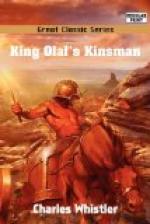“Lord king,” I said, “what I can I will do, but I think there are men better fitted than I to guard our queen.”
“None whom we trust more fully,” the king said.
“See, my queen, this is he to whom you must look for furtherance of your journey.”
Then Emma turned from the window, and her face was still unmoved.
“I can trust Redwald,” she said. “It will be well.”
But Eadward wept openly, for he knew that the king spoke of the day when he should die.
“That is well,” the king said, and leaned back on his pillows. “Now have I no care left. Yet it is hard to put so heavy a burden on your young shoulders, my thane.”
“It is an honour rather,” I answered. “May I be worthy thereof.”
Then a brightness came over the king’s face, and he answered me slowly and plainly, and with great joy, as it were.
“Presently I shall meet with Eadmund, your martyred king, and to him I will say that his thane of Bures is worthy.”
“Forget me not also, my father, when you come to that place,” Eadward said.
“I will not forget. Now is given me to see plainly what shall be in the time to come—to what all tends even now. For now in the time of my death comes to me rede unearthly, as I think. There must be a strong hand who shall weld England into one—who shall bid our land forget that difference has ever been betwixt Angle and Saxon, Jute and Northumbrian, Mercian and Wessexman, Saxon and English and Dane. And when that wonder is wrought, then shall come peace and a new life to the land, under one who will give them the laws that they need to bind them into one English race, strong and honest, and patient in all things.”
Then said Eadward, as the king ceased:
“That is what those who love England would most hope for.”
But his voice was hushed, as in the presence of one who sees beyond this earth.
Thereat the king looked on him, and said:
“Have patience, my son, and you shall see it; aye, and you shall have part and share therein.”
After that he spoke no more, and for a time we waited beside him. Soon he seemed to sleep, and I rose at a sign from the queen and left his chamber. Nor did I ever see Ethelred our king alive again. For when the morning came he had laid his heavy burdens down and had passed to the rest that he longed for. And the bells that rang merrily for St. George’s mass ceased, and the toll for the dead went mournfully over the city.
“Eadmund is king, God help him,” men said.
So it came to pass that even as they buried the king in the great Church of St. Paul the Danish armies were closing round the city, and when I went to Olaf to beg him to advise me concerning the flight of the queen, he answered:
“You and I must part, my cousin. For you had better take ship from some quiet port, and that on the southern coast, and so make for Normandy. But I must see the citizens through this siege, and then I will come to you at Rouen, and we will take counsel together again.”




